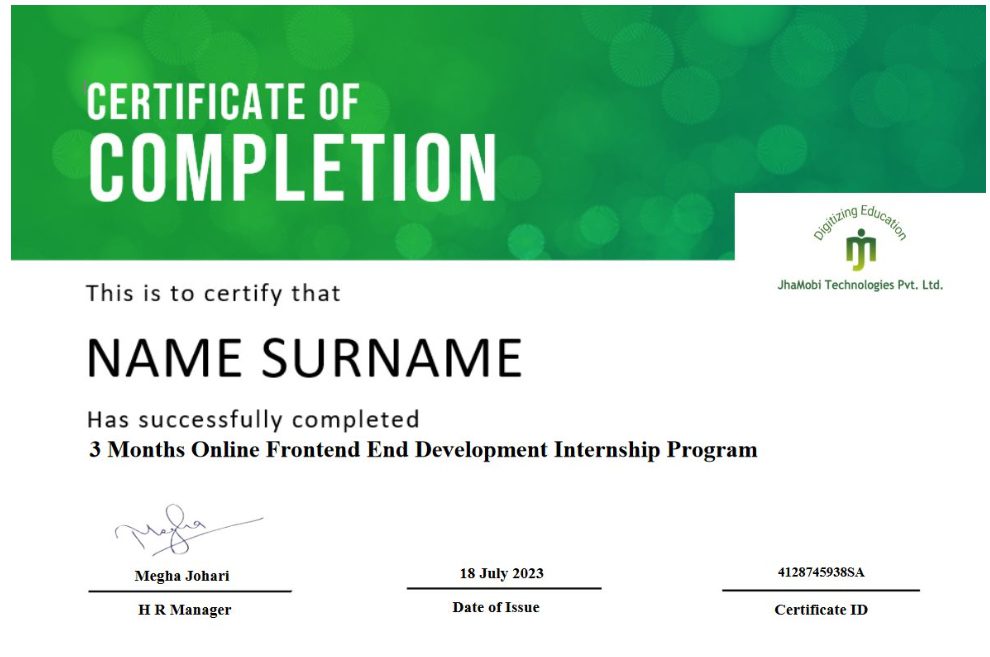Software Testing
Course Overview
A Software Testing course typically covers a range of topics related to the process of ensuring the quality and reliability of software. The course may include both theoretical concepts and practical hands-on experience. Below is an overview of the key topics commonly covered in a Software Testing course:
Course Duration:
6 months. This allows for an in-depth exploration of Digital marketing concepts and practical hands-on experience.
Key Features
- Online mode of learning
- Lifetime access to self-paced learning
- Time flexible to start an internship at any point in time
- LMS-supported with digital content and live classes
- Hands-on project execution of the live project.
- Mentor allocation for every intern for the live doubt-clearing session.
- Job placement calls for assurance after completing the internship.
- Free career counseling
- Proctored practice exams/Quizzes
- Available on Mobile App.
Application Process:
Join Our Internship Program by filling application form on https://jhamobi.com/internship/
Mail to admin@jhamobi.com
Call +91 8605666060 / +91 98185 80529
Shortlisted candidates will be selected based on Eligibility criteria and academic performance.
Skills Covered
- Communication Skills:
- Analytical Skills:
- Critical Thinking:
- Attention to Detail:
- Time Management:
- Adaptability:
- Problem-Solving:
- Curiosity and Learning Attitude:
- Domain Knowledge:
Course Curriculum
Eligibility
A bachelor’s degree in computer science, information technology, software engineering, or a related field is often preferred. However, some entry-level testing positions may accept candidates with degrees in other disciplines if they have relevant skills and experience.
- A good understanding of software development processes.
- Knowledge of programming languages is beneficial but not always required, especially for entry-level positions. However, for roles involving automation testing, proficiency in scripting languages may be necessary.
Pre-requisites
Course Content
Software Testing
- Definition of software testing.
- Importance of testing in the software development life cycle
- Testing principles and fundamentals.
- Different levels of testing (unit testing, integration testing, system testing, acceptance testing).
- Testing types (functional testing, non-functional testing).
- Creating a test plan.
- Defining test objectives and scope.
- Identifying test deliverables.
- Estimating resources and schedule.
- Writing effective test cases.
- Test case design techniques (equivalence partitioning, boundary value analysis, decision tables, state transition diagrams).
- Traceability matrix.
- Test execution process.
- Test data creation and management.
- Test execution tools.
- Defect tracking and management.
- Understanding the defect life cycle.
- Defect identification, logging, tracking, and reporting.
- Introduction to automation testing.
- Choosing test cases for automation.
- Popular automation testing tools (Selenium, JUnit, TestNG).
User Research: User research in digital marketing involves gathering insights and understanding the needs, behaviors, and preferences of the target audience or users. It plays a crucial role in shaping marketing strategies by providing valuable insights that guide decision-making and enhance the user experience. Students will learn more about conducting research methods such as surveys, interviews, usability testing, and data analysis, marketers gain a customer-centric perspective, enabling them to create more effective campaigns, optimize website usability, and develop products or services that align with user needs.
- Introduction to security testing.
- Common security testing techniques.
- Security testing tools.
- Challenges and considerations in mobile app testing
- Mobile testing tools (Appium, XCTest, Espresso)
- Testing in Agile methodologies.
- Role of a tester in Agile teams.
- Continuous integration and continuous testing.
- Integration of testing in the DevOps pipeline.
- Continuous testing in DevOps.
- Best practices in software testing.
- Risk-based testing.
- Exploratory testing
- Communication skills.
- Collaboration and teamwork.
- Problem-solving skills.
- Applying testing concepts to real-world scenarios.
- Hands-on projects to gain practical experience.
- Overview of relevant certifications (ISTQB, CSTE, etc.).
- Exam preparation tips.
Industry Project
SEM Live Project - Google Ads
Web Analytics - Live Project - Google Analytics
Email Marketing Live Project - GetResponse
Content Marketing Live Project - CMS like WordPress
Exam & Certification
JhaMobi Technologies certificates are given after completing full assignments and Mock Tests, quizzes/tests and Final exam online. Interns have to complete courses in 3 months. The certification exam is free of cost.
70 Marks will be allocated for assignment/live project and 30 Marks will be allocated for an proctored examination.
A minimum of 40 % passing marks (i.e. at least 28 marks in assignment/live project & 12 Marks in proctored examination) will be required for being eligible for the Certificate.
Kindly note:- The students enrolled in Universities/Institutions/Colleges can avail of Credit Transfer as per UGC Regulations, 2021 for this course. The Host Company for this Credit Transfer will be JhaMobi Technologies Private Limited

FAQs

During my internship at JhaMobi Technologies Private Limited from December 2015 to May 2016, I had the privilege of experiencing a dynamic and innovative work environment. The team's commitment to quality and their encouragement of learning made it an invaluable experience for me as a software test engineer. I was exposed to cutting-edge testing methodologies and had the opportunity to work on challenging mobile app projects like Deeksha and YoApp. This internship not only enhanced my software testing skills but also fostered a strong sense of teamwork. I am grateful for the support and mentorship I received at JhaMobi Technologies, which played a pivotal role in shaping my career.
